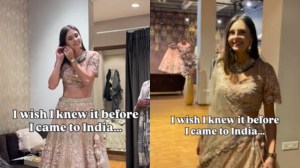Justice B R Gavai, on his last day as Chief Justice of India, backed his bench’s pronouncement on the timelines for Governors to clear bills, saying there cannot be a “straitjacket formula” and that a “reasonable period” would depend on the facts of each case.
“If the Constitution doesn’t provide for it, you cannot read something which is not there in the Constitution. It is for Parliament,” the outgoing CJI told reporters Sunday.

On November 20, the five-judge Constitution bench headed by the CJI had said in response to the reference made by President Droupadi Murmu that no timeline can be fixed for the President and Governors to act on Bills passed by state legislatures. The bench, however, also said that “inaction that is prolonged, unexplained and indefinite” by the Governor “will certainly invite limited judicial scrutiny”.
On Sunday, asked why the court had not defined a reasonable time limit, Justice Gavai said there could be multiple factors that could prevent a Governor from taking a decision within a particular time.
“We have only relaxed the timelines, but we have also balanced it by saying that the Governor cannot sit over the Bill for endless time and the judiciary by a legislative interpretation cannot reach something in the Constitution which is not there,” he said.
“And therefore, though we have said that no timelines can be provided, a limited judicial review when the Governor fails to exercise his discretion is available and that will have to be decided on facts and circumstances for each case. You can’t have a straitjacket formula that in every Bill, if it is not passed within one month, it will be deemed to have passed.”
Justice Gavai said the independence of the judiciary was non-negotiable and that the Collegium system helps maintain this. He also said that the belief that a judge is not independent if he or she does not decide against the government is incorrect.
Story continues below this ad
“For a judge, you don’t decide as to whether the litigant is the government or the private litigant. You decide as per the papers before you. In a case the government may succeed, in a case the government may lose. But thinking is some quarter that unless you decide everything against the government, you are not an independent judge, (is) not a correct approach,” he said.
Justice Gavai responded to queries on the Collegium recommending the name of former Patna High Court Chief Justice Vipul Pancholi to the SC despite dissent by one of the five members, Justice B V Nagarathna. Asked if the dissent had any merit, he said: “If it would have (had) any merit, the four judges would not have agreed on that name.”
Recalling his judgement calling for exempting the creamy layer from Scheduled Caste reservation, the CJI said the question of implementation is up to the executive and Parliament.
“Equality has to be given real effect (and) if equality has to mean real equality, then the benefits of affirmative action should percolate to the really needy persons… No doubt some people are saying that the economic criteria should not be made applicable to SCs because reservation is based on societal issues. But in the last 75 years, we have seen that many SC families have progressed. We have seen… in the first generation (one) gets the reserved category (benefits), in the second generation his son gets it, in the third generation his grandson gets it. So are they really in need of reservation when they are having education in the best of the schools… According to me it will lead to a class within a class.”
Story continues below this ad
About the factors why he could not elevate any woman judge to the SC benches during his tenure as CJI, he said: “One thing is of course… there has to be consensus. If not consensus, at least four judges have to be. It can go by majority only by four to one. We considered some names but there’s no consensus and therefore couldn’t get anyone.”
The CJI said that his decision to forgive the lawyer who threw a shoe at him in the court was taken at the spur of the moment and may have had to do with his upbringing.
On criticism of transfer of High Court judges, he said: “Largely the transfers that were executed during our period were in the larger interest of greater administration of justice.”
The CJI added, “of course, some of the transfers were on the basis of some complaints received about some judges conduct but those transfers were made only after verification from the concerned quarters (and after taking) the views of the consultee judges.”
Story continues below this ad
CJI Gavai said he doesn’t believe that the judiciary should always have a friction with the government and pointed out that on questions of infrastructure development etc, the latter has to be taken into confidence.

































